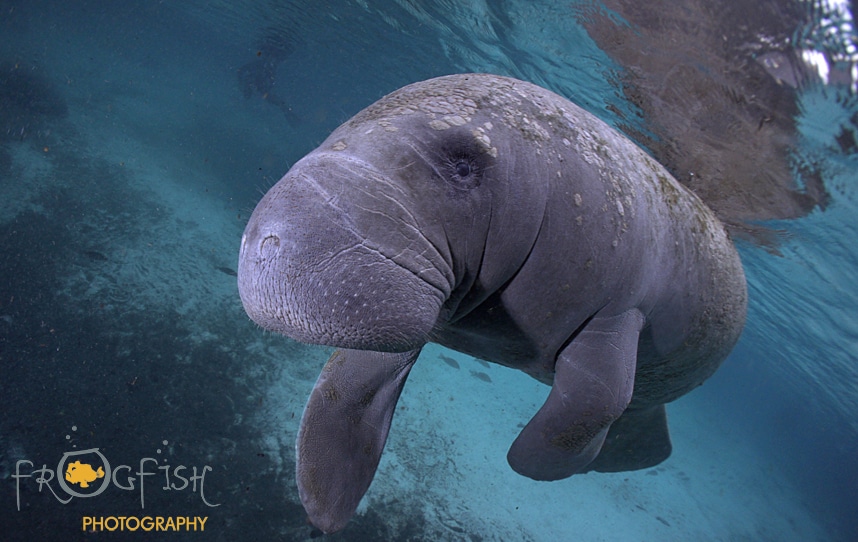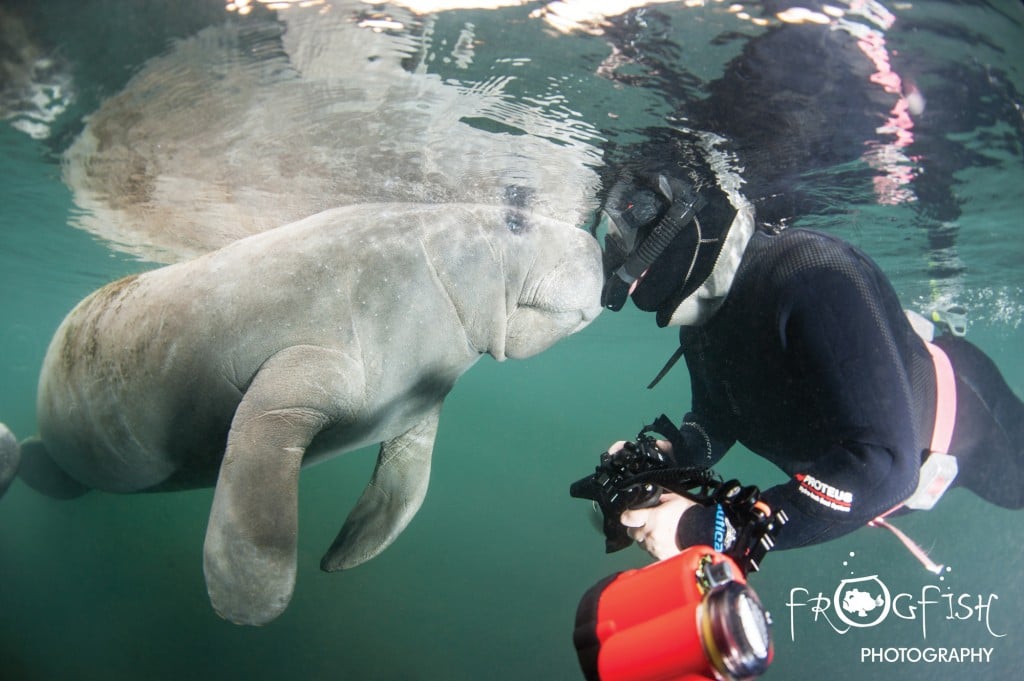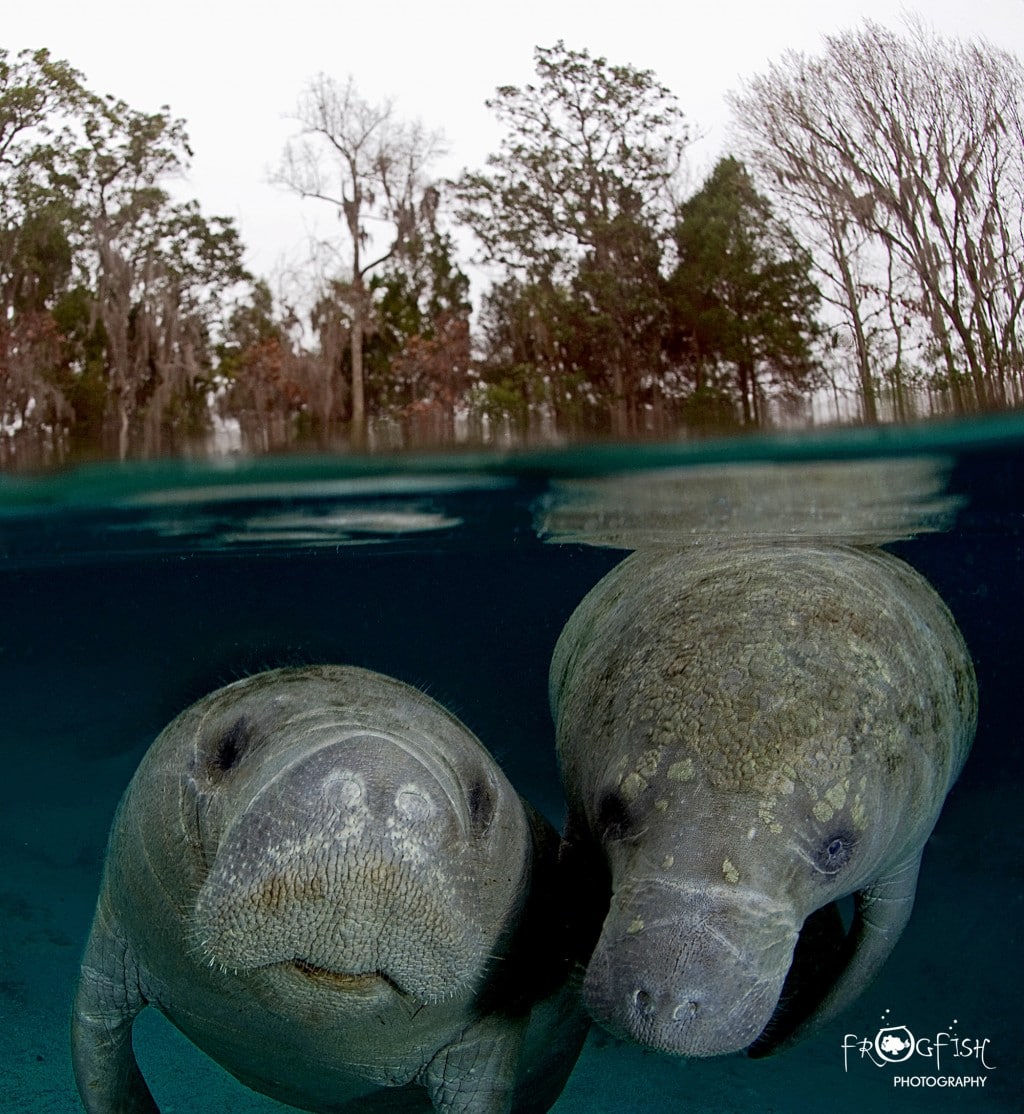Marine Life & Conservation
Manatee Awareness Month – Be Active and Secure Their Future

November is Manatee Awareness Month – a time to celebrate Florida’s beloved, iconic, marine mammal and also to create awareness and shed light on the many challenges imperiled manatees face every day.
Manatee watercraft-related injuries and deaths continue to rise. It is the largest known cause of death from human activity and the greatest threat to their long-term survival. The boating public is urged to be on the alert for manatees since vessel operators are the only ones who can prevent strikes to manatees that often lead to serious injury or worse. Many seasonal manatee zones in Florida come into effect in November, and boaters should pay close attention to posted signage indicating slow or idle speeds. Waterway users should also keep their distance from migrating manatees or manatees congregated at warm-water sites during the winter to avoid possible harassment. The boating community can download the free Manatee Alert App for iPhones and iPads at http://bit.ly/15EYen6, which notifies boaters when they are approaching manatee speed zones and helps facilitate the reporting of injured manatees and harassment. Check out the videos, tips, and resources for boaters at savethemanatee.org/boatertips.

With winter approaching, manatees are also susceptible to cold stress. A severe, prolonged cold snap in Florida can be deadly to this subtropical species who cannot tolerate prolonged exposure to water temperatures below 68 degrees Fahrenheit. Many manatees also die from red tide outbreaks. The protection and preservation of ample healthy aquatic habitat is essential to the well-being of the manatee population. The protection of Florida’s 700+ springs is not only vital to manatees, but to countless other wildlife species, and to humans. The health of a spring indicates the health of the underground aquifer, which supplies much of Florida with potable water.
“The best way to protect manatees is for the public to learn about their plight, and how protecting them is in all our best interests if we care about healthy aquatic ecosystems,” says Patrick Rose, Executive Director of Save the Manatee Club. “Whether passively observing our waterways or actively engaged in water-related activities such as boating, fishing, or diving; we should understand our role as responsible stewards of manatees and their habitat, and how it can be beneficial to those things we hold dear.”
The public can be actively engaged in manatee and habitat protection during Manatee Awareness Month and throughout the year by obtaining the Club’s free waterway signage, boating banners and decals, waterway cards, and educational posters. The shoreline property signs warn boaters to slow down for manatees and feature the Florida Fish & Wildlife Conservation Commission’s hotline number (1-888-404-3922) to report sick, injured, orphaned, or harassed manatees. The Club also produces family-friendly outdoor signs for state, municipal, and county parks, marinas, and other sites where human/manatee interactions are a problem. To obtain any of these free materials, email education@savethemanatee.org or call 1-800-432-JOIN (5646) and request these resources.

Educators can request a free guide filled with classroom activities and interesting manatee facts. Save the Manatee Club also offers “Skype in the Classroom,” which explores manatee basics and the threats they face in their habitat today. Lessons are available for younger audiences through high school students. The Club is also able to align with science standards upon teacher request. Click the “Education Materials” link at savethemanatee.org/info.
The public is also encouraged to visit Save the Manatee Club’s Blue Spring webcams at ManaTV.org to see manatees in real time or on archived video. The webcams have become popular with viewers across the globe and have allowed the Club to monitor manatee behavior for research and health-related conditions. The site also features researcher Wayne Hartley’s daily blog on manatees visiting the spring. Hartley is the Club’s Manatee Specialist and a former Park Ranger at Blue Spring State Park. He has been researching the Blue Spring manatees since 1978.
Another way to help is by joining the Club’s real, living Adopt-A-Manatee® program year round. Each “adoptive parent” learns about the species by following the manatee they’ve chosen through adoption materials and follow-up newsletters the Club provides. To learn more, visit the adoption page of the web site at savethemanatee.org/adopt.
“Education and public awareness remain the key to savings manatee lives,” says Rose. “Working together and caring about the manatee’s welfare provides a better chance that these amazing animals will receive the help and protections they need – from all of us – for their long-term survival.”
Check out Save the Manatee Club’s website at savethemanatee.org to get involved.
Marine Life & Conservation
Paul Watson Released as Denmark Blocks Japan’s Extradition Bid

Renowned anti-whaling activist Paul Watson has been released from custody in Greenland after spending five months in detention. Denmark’s Justice Ministry rejected Japan’s request for his extradition, citing insufficient guarantees that his time already served in custody would be credited against any potential sentence.
The 74-year-old Canadian-American was arrested on July 21 in Nuuk, Greenland’s capital, when his ship docked to refuel. His arrest was based on a 2012 Japanese warrant related to a 2010 encounter in Antarctic waters. Japan alleged Watson obstructed operations and caused damage to a whaling research ship during efforts to disrupt illegal whaling. Watson has consistently denied these claims, maintaining his commitment to marine conservation.
Denmark, which oversees extradition matters for Greenland, concluded that while the legal conditions for extradition were met, the lack of assurances from Japan regarding time-served credit made extradition untenable.
In a video shared by his foundation, Watson expressed gratitude and relief, saying, “After five months, it’s good to be out… and good to know they’re not sending me to Japan.” He added that the most difficult part of his time in custody was being separated from his two young sons.
Watson is a pioneering figure in marine conservation, known for founding the Captain Paul Watson Foundation in 2022 after decades of activism with the Sea Shepherd Conservation Society. His bold efforts to defend marine life have earned him widespread support, including from celebrities and conservationists. His work has also been featured in the acclaimed reality TV series Whale Wars.
Watson’s lawyer, Jonas Christoffersen, praised the decision, stating, “We are happy and relieved that Paul Watson is now free.” He added that Watson is eager to reunite with his family and continue his vital work.
The arrest occurred while Watson’s vessel, the M/Y John Paul DeJoria, was en route to the North Pacific with a team of 26 volunteers to intercept a Japanese whaling ship. His foundation described the arrest as politically motivated and emphasized that Watson’s actions were focused on ending illegal whaling practices.
Japan resumed commercial whaling in 2019 after leaving the International Whaling Commission, asserting that whale meat is a cultural tradition. Conservationists, however, continue to challenge these practices, highlighting their impact on marine ecosystems.
Despite the challenges, Watson remains steadfast in his mission to protect marine life and bring attention to whaling practices. His dedication to ocean conservation has made him a globally respected advocate for the environment.
Marine Life & Conservation
12 Days of Zero-Waste Fish-mas

This holiday period, the Marine Conservation Society, the UK’s leading ocean membership charity, invites you to make some simple changes to eating fish this Christmas to help our seas.
Dr Kenneth Bodles, Head of Fisheries and Aquaculture at the Marine Conservation Society, said, “During the festive season, our consumption increases, but so does waste. Sustainability isn’t just about where food comes from – it’s also about how you use it. By reducing waste and making the most out of your seafood, you’re not only taking steps to be more ocean-friendly, but can also help to cut costs during what is often one of the most expensive times of the year”.
The Marine Conservation Society has compiled twelve tips on how to consume seafood sustainably with zero-waste this Christmas:
Buy whole fish instead of fillets
Instead of fillets, consider buying whole fish such as salmon, hake, or lemon sole. By adopting a “nose to tail” approach with cooking, whole-baked fish not only feeds a crowd, but also helps to minimise waste and maximise sustainability by using up every part of the animal, including bones, skin, and fat.
Make fish stock
Leftover fish bones or shells can be put to good use by boiling them to make a nourishing fish stock or bisque. This can be frozen and preserved for later use and makes for a flavourful base in a soup.
Make your own fish pâté
Avoid waste by turning leftover fish, such as smoked mackerel or salmon, into a delicious pâté by blending with cream cheese and lemon. Perfect when paired with crackers.
The sustainability of salmon and mackerel varies depending on where and how it is caught or farmed. For more information on green-rated options, check the charity’s Good Fish Guide.
Buy frozen
By purchasing seafood that is frozen or vacuum-packed, this helps to reduce waste by extending the shelf life of your food.
Fish pie
If you’re wondering what to do with leftover cooked fish, why not opt for a classic fish pie with mashed potatoes, leeks, and a cheesy sauce? A sure crowd pleaser on Boxing Day.
Use the head
Don’t forget the fish head! The meat is incredibly tender and flavourful. The charity recommends a cod’s head curry or recreating Fallow’s renowned cod’s head in siracha butter.
By stretching your ingredients further, not only is this a more sustainable way to enjoy seafood, but also cost-effective by repurposing leftovers and cooking creatively.
Boxing Day brunch
Mix leftover kippers or smoked salmon with scrambled eggs for a tasty, zero-waste, Boxing Day brunch.
For best choice, make sure you buy kippers, or herring, from the North Sea and the North Irish Sea.
Zero-waste storage
A top tip from the Marine Conservation Society to avoid waste is freezing fish offcuts to save for future use.
Crisp up the skin
Even leftover fish skin can be turned into a quick savoury snack by crisping it up in an air fryer with a little olive oil and salt.
Anchovies two ways
Leftover anchovies can either be blended with butter to make a delicious anchovy butter or tossed into pasta for a hit of umami flavour.
The charity recommends opting for anchovies caught in the Bay of Biscay for best choice.
Fishcakes
For an easy, zero-waste meal, leftover seafood trimmings can be mixed with mash and fried in breadcrumbs to make fishcakes.
Pickled mussels
Try pickling mussels in 1:1 vinegar and water, with a dash of sugar for a sustainable, zero-waste snack that can be enjoyed well beyond the festive season.
Mussels farmed in the UK are a seafood superhero. Grown using low-impact methods and harvested by hand, they get all the food they need from the sea around them. This makes them one of the most sustainable, ocean-friendly, and cost-effective seafood options.
Players of People’s Postcode Lottery have raised £6.6M towards the Marine Conservation Society’s vital work in making seafood more sustainable.
Laura Chow, Head of Charities at People’s Postcode Lottery, said: “Fish is a festive favourite for many, but making sustainable choices when it comes to how we buy and eat seafood makes all the difference for our ocean. Support from players of People’s Postcode Lottery has helped the Marine Conservation Society further its sustainable seafood work, so that we can all enjoy healthier, better protected seas.”
The Marine Conservation Society encourages you to make sustainable seafood choices a year-round habit, not just for Christmas. To check how sustainable the seafood on your plate is, you can visit the charity’s Good Fish Guide. The Guide helps consumers and businesses identify the most sustainable seafood using a simple traffic light system, based on where and how species are caught or farmed. Green is the best choice, amber means improvements are needed, and red indicates fish to avoid buying.
Zero-waste gift idea
Why not embrace a zero-waste Christmas by gifting a membership to support marine conservation? It’s a meaningful, low-waste gift that helps protect our ocean for generations to come. Memberships start from as little as £5 a month – the price of a sandwich and drink from your local coffee shop.
Find the latest sustainable seafood advice for wild-caught and farmed seafood on the Good Fish Guide, downloadable to your phone from www.mcsuk.org/goodfishguide.
-

 News3 months ago
News3 months agoIconic SS United States to become the World’s Largest Artificial Reef
-

 Blogs2 months ago
Blogs2 months agoScubaverse Christmas Gift Guide 2024: Day 4
-

 News2 months ago
News2 months agoSanta Divers take the Plunge for Charity
-

 Blogs2 months ago
Blogs2 months agoScubaverse Christmas Gift Guide 2024: Day 1
-

 News3 months ago
News3 months agoDiscover Turquoise Divers and Media Luna Beach & Dive Resort: A Premier Diving and Relaxation Destination in Roatan
-

 Blogs2 months ago
Blogs2 months agoScubaverse Christmas Gift Guide 2024: Day 5
-

 Blogs2 months ago
Blogs2 months agoScubaverse Christmas Gift Guide 2024: Day 2
-

 News3 months ago
News3 months agoToucan Diving at Plaza Beach and Dive Resort Bonaire Introduces PADI Mermaid Training



